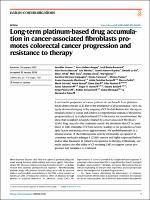Long-term platinum-based drug accumulation in cancer-associated fibroblasts promotes colorectal cancer progression and resistance to therapy
Autor/a
Data
2023-02-10Enllaç permanent
https://hdl.handle.net/11351/10040DOI
10.1038/s41467-023-36334-1
ISSN
2041-1723
PMID
36765091
Paraules clau
Microambient del càncer; Quimioteràpia; Marcadors predictiusCitació recomanada
Linares J, Sallent-Aragay A, Badia-Ramentol J, Recort-Bascuas A, Méndez A, Manero-Rupérez N, et al. Long-term platinum-based drug accumulation in cancer-associated fibroblasts promotes colorectal cancer progression and resistance to therapy. Nat Commun. 2023 Feb 10;14:746.
Audiència
Professionals
Aquest element apareix a les col·leccions següents
- HVH - Articles científics [4471]
- VHIO - Articles científics [1250]
Els següents fitxers sobre la llicència estan associats a aquest element:

 Àrea privada
Àrea privada Contacte
Contacte








